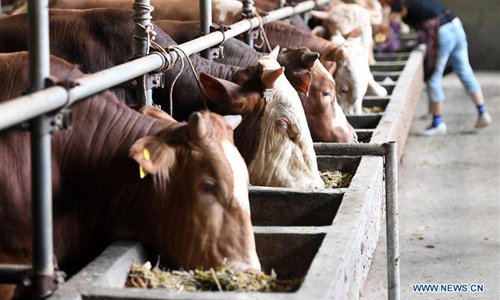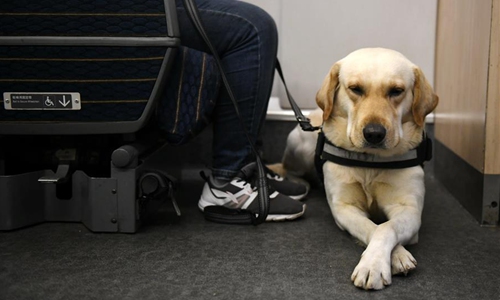
A farmer feeds cattle at a cooperative in Anning Village of Dongmiao Township in Du'an Yao Autonomous County, south China's Guangxi Zhuang Autonomous Region, July 24, 2019. Du'an Yao Autonomous County has been dedicated to developing cattle raising industry as a way to boost farmers' income, through joint efforts from four bases, five leading enterprises, 250 cooperatives, 280 family farms and thousands of individual households, with cattle breeding stock so far standing at 150,000. (Xinhua/Lu Boan)
Chinese Ministry of Agriculture and Rural Affairs released a positive list of livestock and poultry on Friday, which for the first time clarified the 33 species of animals that can be raised in households, excluding dogs.
The National Catalogue of Livestock and Poultry Genetic Resources consists of 17 species of animals traditionally raised in China, including pigs, cows, goats, chickens and ducks, and 16 exotic animals such as deer, alpacas, turkeys and ostriches. Some animals included in the list are inedible, such as minks, foxes and raccoon dogs.
The ministry pointed out that these livestock and poultries have been trained and bred by human beings for long and can be used in agricultural production. Besides, they can multiply under artificial feeding conditions and provide humans with meat, eggs, milk, fur and fiber products. They will be raised according to China’s Animal Husbandry Law.
Notably, dogs are excluded from the positive list. The draft of the catalog has aroused public concern whether dogs, being a pet, should be prohibited from consumption.
The ministry replied that dogs are deemed as pets instead of traditional livestock across the world, so they are not suitable for livestock and poultry, as per the Animal Husbandry Law.
The ministry explained that China has a long domestication history of dogs. In the past, dogs were raised to guard households, used in hunting, and as shepherds. Today, their breeding purposes are diverse, which include being used as pets, rescue dogs or guide dogs.

A guide dog takes a train in northwest China's Shaanxi Province, Jan. 12, 2020. Guide dogs are trained to adapt to taking bullet trains in order to help visually impaired passengers navigate during the Spring Festival travel rush. (Xinhua/Li Yibo)
Although dogs are not listed in the catalogue, the ministry made it clear that dogs can be raised, and related departments and local authorities have accumulated experience and worked out regulations to manage dogs, such as their registration and compulsory immunization.
The topic of dogs excluded from the positive list on Sina Weibo garnered over 112,000 likes and more than 10,400 comments as of Saturday. While several users supported the decision and agreed with the ban on dog consumption, some believe poisoning and killing dogs must also be banned.
Global Times
